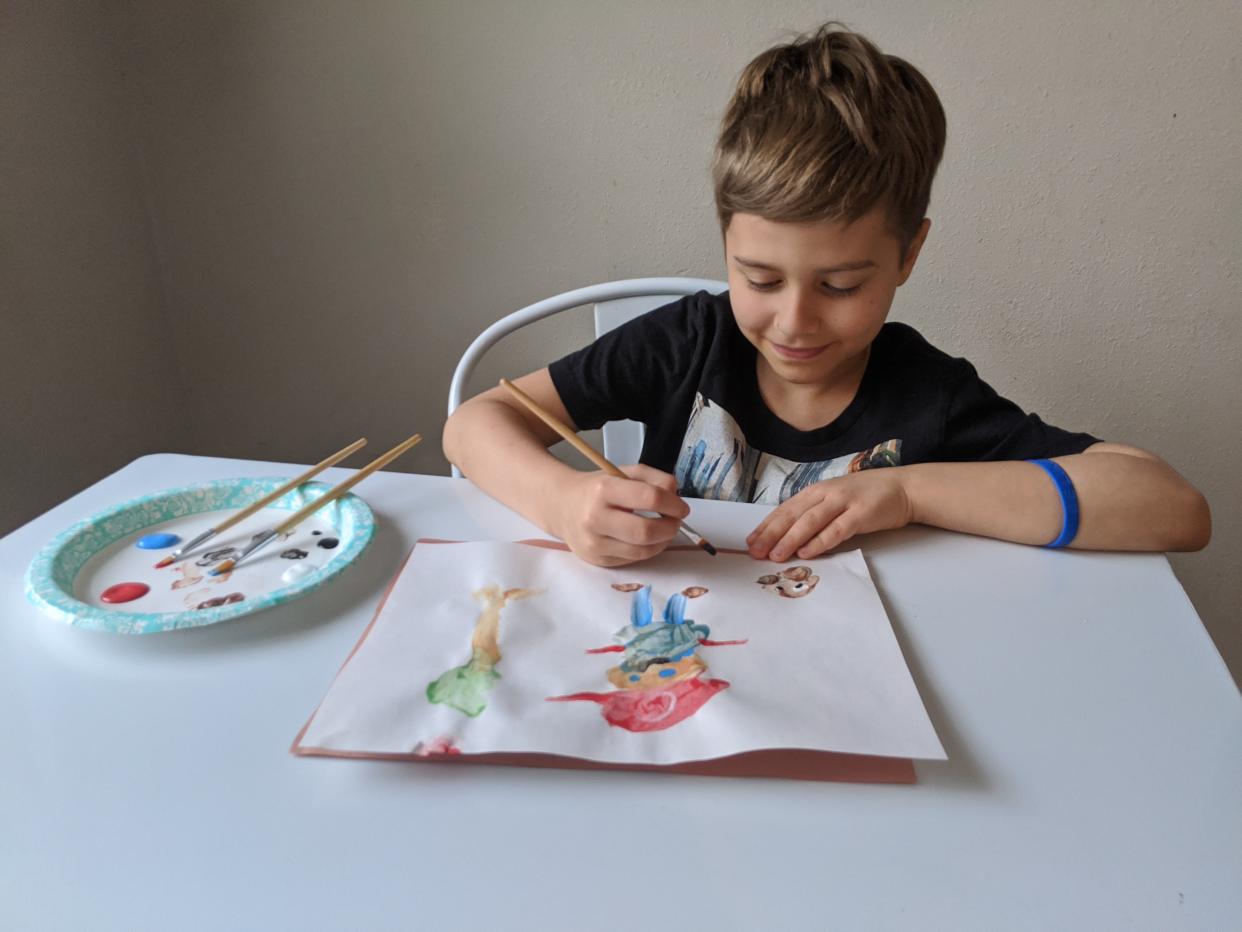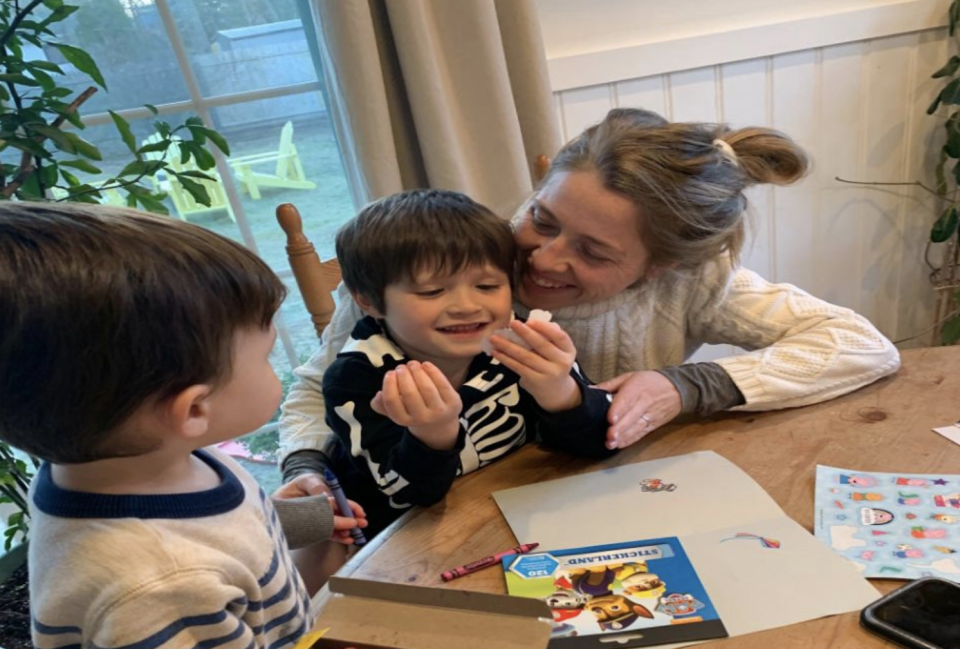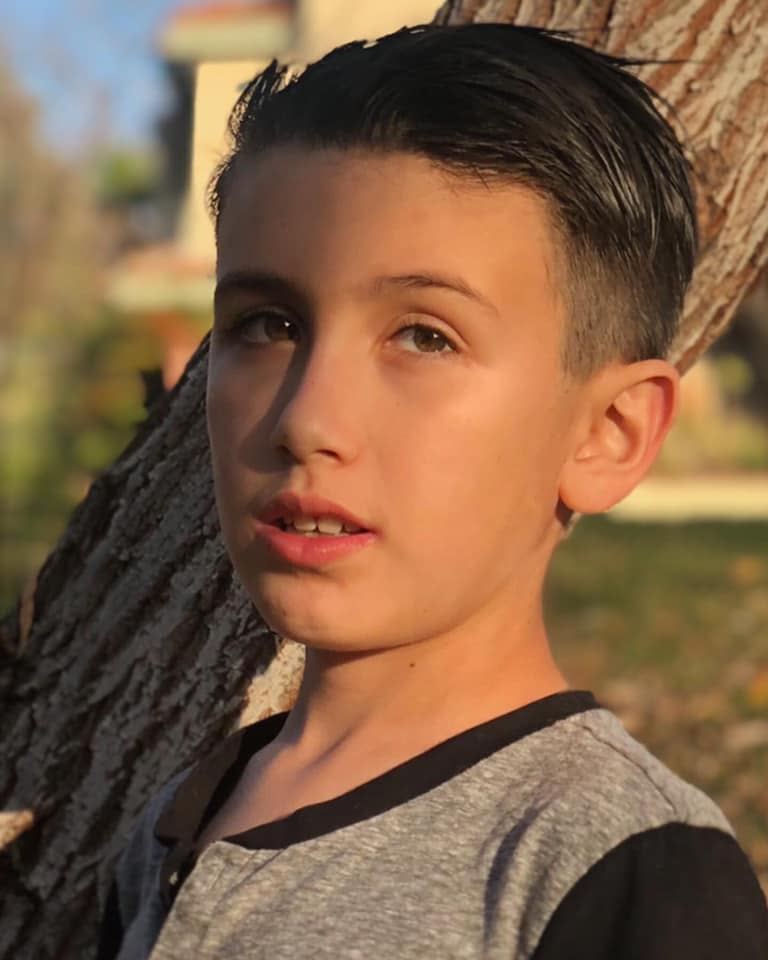What it’s like to homeschool a child with autism during the pandemic: 'We are doing the best we can'

Among the many disruptions brought on by the coronavirus pandemic have been school closures, which have left countless parents scrambling as they take on new homeschooling responsibilities. Supervising online tutorials, carving out daily lesson plans, and juggling careers with 24/7 child care isn’t easy on anyone. But it can be especially overwhelming and draining when a child has special needs and school is much more than a classroom — it’s therapy, hands-on attention, the source of social connections and a sense of structure, stability and comfort that’s difficult to replicate.
Mel Cole, a photographer based in Austin, Tex., has been homeschooling her 8-year-old son Jude, who is on the autism spectrum, since school closed in mid-March. It’s been a situation fraught with challenges — primarily, the absence of a routine and school environment Jude has come to depend on, and the presence of two toddler-aged siblings who make it difficult for a boy who is “very sensitive to noise” to focus on schoolwork.
“His 2-year-old sister crying is his biggest bother right now,” Cole tells Yahoo Life.
“Distance learning has been so difficult,” she says. “Jude just doesn't learn this way. He has been in the public schools since he was 3 years old. He has a very specific schedule at school, and environment is everything to Jude. So being home ‘for school’ has been hard on him.”
Accepting that it will be a rocky transition has helped relieve some pressure. And like many parents, Cole is finding creative ways to weave in learning opportunities throughout the day, especially when Jude needs a break from traditional schoolwork. He’s being taught new life skills, from helping tend the family garden to mastering the coffee machine.
“It has taken lots of patience and understanding on my part that Jude will probably regress during this time, and it is what it is,” she says. “We are doing the best we can. His emotional state is my main priority. So if schoolwork isn't going well that day, we stick to the basics, read and play in nature. This makes him happy.”

Long Island-based mom Kristen Teodoro says her 4-year-old son Hudson, who is on the autism spectrum and is nonverbal, has also struggled to adjust to his new homeschooling norm. Before the pandemic-prompted school closures, “things were really just starting to come together for him in school,” she tells Yahoo Life, adding that her son would happily run into his school, which specializes in children on the spectrum and with developmental delays, each morning. Hudson, who also has ADHD, had a full-time aide keeping him on task, attended classes with a low student-teacher ratio, and met with speech and occupational therapists four times a week, respectively.
Since schools closed in late March however, the routine he’s counted on has been replaced with Zoom therapy sessions and prerecorded videos from his teachers. Being at home round-the-clock took two or three weeks of adjustment, his mom says; reintroducing his therapy sessions, now conducted online, in mid-April kickstarted another round of growing pains. The switch from a classroom to a computer screen hasn’t been easy — Teodoro says it’s a “struggle to get him to cooperate, but we are getting there with baby steps” — and has impacted the entire family. Teodoro has had to put her own work “on the backburner” as she tries to balance Hudson’s multiple video sessions with her 1-year-old son Tucker’s needs.
“It has been exhausting,” she says. “I am his mother, I am not a special needs teacher or therapist with years of experience and education. Just getting Hudson to cooperate during his sessions is a tiring task in itself! But he is doing better and pushing forward, which energizes and motivates me to keep going.”
She credits his “amazing” teachers and therapists for continuing to provide support, from making suggestions for household items to replicate an occupational therapy gym experience, to simply cheering her on.

“They check in constantly and are so encouraging and insightful with tips and tricks for making it work at home,” she says. “Some text me with ideas or activities throughout the week that would be good for Hudson. Just that alone — knowing how much they care, are constantly thinking of him, and want him to thrive are so awesome and help us push through the rough moments of homeschooling.”
As summer approaches, Teodoro remains cautiously optimistic that Hudson’s summer program will proceed as planned. But many caregivers around the country have already been notified that their camps and summer sessions have been canceled this year — a particular blow for kids with disabilities and special needs who cherish this time to be in the company of their peers and gain a little independence; for parents, too, it’s a welcome respite. Kimberly Aguilar, a California-based mom, tells Yahoo Life that she and her husband are still debating how to break the news to their son Noah that he isn’t headed to camp this summer. The 10-year-old is “pretty severe” on the autism spectrum and is low-verbal; his special needs summer camp is “his favorite thing all year.”
“It is hard to know really how much he comprehends, but I would not be surprised if he starts to say ‘camp’ over the summer and grabs one of the pictures on his desk with his counselors, as we frame and keep them all,” she says. “Usually, that is how he communicates about things; he uses a couple of words or phrases, and grabs an item. Like saying ‘beach’ and grabbing his wetsuit, or ‘walk’ and putting on his shoes.”

It’s the latest blow for the boy, who has been having a “really hard time” moving away from the structured schedule and personalized, hands-on attention of his special autism classroom (SAC) at a local public school. Noah struggled to focus while doing his speech therapy over Zoom, and competes for attention with his younger sister, described as a 6-year-old social butterfly who is having her own struggles with the switch to homeschooling away from her classmates.
“As parents, we have had to really step up with patience and spend a lot of time on the trampoline with him, at the pool, and in the ocean as therapy,” his mom says. “He is low-verbal, so he melts down and cries when frustrated.”
But there have been signs of improvement. After temporarily stopping all therapy — speech, occupational and Applied Behavior Analysis (ABA) — as a safety precaution, his parents have arranged for some weekly sessions to resume in person.
Dr. Donna Murray, vice president of Clinical Programs and head of the Autism Treatment Network at national autism advocacy organization Autism Speaks, tells Yahoo Life that the pandemic has really put families with special needs children to the test, as it’s meant going without not just school but also therapy and other much-needed support. Pivoting to Zoom just isn’t possible for many students.
“Not only are families suffering from reduced income, closed schools and closed day programs, but individualized educational and vocational supports sometimes cannot be delivered remotely or are more limited in hours per week or scope,” Murray says. “Many appointments have shifted to telehealth, which is a great alternative, but may not be the right fit for every child. There is also an overall lack of connection with the community.”
And because needs and challenges vary greatly from person to person, Murray notes that some kids are leaning into online learning. For those missing the structure of a classroom and in-person contact, however, this period “can mean a loss of previously acquired skills, including academic and social skills.”
“There are two trends that are emerging,” she adds. “Some kids seem have adapted very well and are thriving in the e-learning environment, which has been a great opportunity for parents to see their child’s true strengths. However, since there is no manual on how to adapt to e-learning, some parents are struggling to balance education, therapy and at-home life and are seeing some regression in their children.”
Teaching life skills — like household chores or self-care, as Jude is doing — can help offset this regression. Autism Speaks is also offering support to families with its COVID-19 Information and Resources hub, which features teaching resources, health and safety tips and more. Parents in need of additional support can reach out to the Autism Response Team (1-888-288-4762 or help@autismspeaks.org) or consider applying for an Autism Cares Grant, which gives direct financial support to those needing assistance with groceries, child care, medication or therapy as a result of COVID-19.
As an uncertain future faces us all, parents like Kristen Teodoro struggle to make long-term predictions about what awaits their children’s education.
“It would be completely heartbreaking if he doesn’t get to go back and work with the team that loves and cares for him so deeply,” she says of her son Hudson’s school.
“I am not sure when things will ever be ‘normal’ again,” she adds. “People’s lives have completely been turned upside down. I think we are entering a whole new way of life and I’m not sure what that means for us or Hudson.”
For the latest coronavirus news and updates, follow along at https://news.yahoo.com/coronavirus. According to experts, people over 60 and those who are immunocompromised continue to be the most at risk. If you have questions, please reference the CDC’s and WHO’s resource guides.
How to maintain your physical and mental health during the pandemic
Taking care of a loved one with COVID-19? Here’s how to stay healthy
Q&A with Dr. Kavita Patel: How to keep your family safe and maintain your mental health
Read more from Yahoo Life:
Coronavirus takes its toll on essential workers: ‘The highest levels of stress we’ve seen’
The Unwind: How we're finding calm during quarantine, from virtual cocktail nights to genealogy
Want daily lifestyle and wellness news delivered to your inbox? Sign up here for Yahoo Life’s newsletter.



